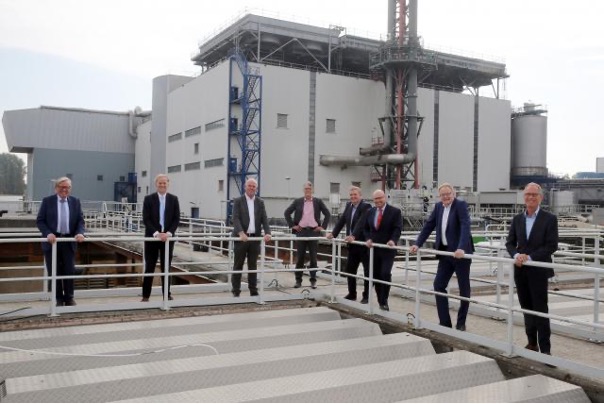
Five water boards (Brabantse Delta, De Dommel, Hollandse Delta, Scheldestromen and Wetterskip Fryslân) produced PHBV in the pilot project ‘PHARIO’ back in 2016. PHBV is a high-quality natural polyester made by using bacteria that purify wastewater. It is fully degradable under natural conditions, in soil and composting facilities as well as in fresh – and salt water.
A partnership between these water boards, knowledge centre STOWA, technology company Paques Biomaterials and sustainable waste and energy company HVC has now been started with the name PHA2USE. This partnership results in a pilot plant in Dordrecht, at the HVC sludge processing plant, for the production of PHBV (P3HB3HV to be precise). With this plant, the partners aim to build a bridge to commercial production. The polymer industry, which now often works with fossil plastics needs sufficient biobased material to test the processing and use to be able to commit to a future commercial uptake of the material. The pilot plant can supply this test volume.
Partners invited
Leon Korving, project manager PHARIO: “In December, a successful pre-test was carried out at the demo site of RWZI Leeuwarden. Next summer, we will carry out an initial extraction of the PHBV in order to start product development. In March 2022, we expect to put the plant into operation. We then want to test the material we produce with various partners and for various applications. We would therefore like to invite parties who are interested in PHBV for their application to discuss with us which development pathway is required and whether we can provide them with material. Suppliers of fatty acids, the raw material of PHBV, are also welcome to contact us.”
PHBV
PHBV is made from organic waste streams such as sewage sludge, industrial wastewater and food waste. There are many fatty acids in wastewater and activated sewage sludge contains bacteria. These bacteria ‘eat away’ the fatty acids. Just as people store fat in their bodies, these bacteria store PHBV. This PHBV is extracted, after which a powder remains that can be used in various applications.
Applications
PHBV can be used in agriculture and horticulture. For example to make biodegradable pots,which eliminates the necessity to repot the crops during cultivation as the pot breaks down naturally. It can also be used in self-healing concrete for cellars and tunnels, for example. By adding PHBV, cracks in the concrete are automatically sealed again. An additional advantage is that usually less (shrinkage) reinforcement needs to be used in self-healing concrete, which in turn contributes to cost reduction and less environmental impact.
Knowledge partners
The experience from the PHARIO project is combined with the knowledge of partner Paques Biomaterials in the pilot plant. Together with TU Delft they are developing a technology to extract PHBV from industrial waste water. Sludge processing Noord-Brabant (SNB), AquaMinerals, TU Delft and Wetsus (knowledge centre for sustainable water technology) also support this initiative with further knowledge development.
Source
Biobased Delta, press release, 2021-04-30.
Supplier
Biobased Delta
Brabantse Delta
HVC Group
N.V. Slibverwerking Noord-Brabant (SNB)
Paques Biomaterials BV
Stowa
University of Technology, Delft (NL)
Waterschap Hollandse Delta
Waterschap Scheldestromen
Wetsus
Wetterskip Fryslân
Share
Renewable Carbon News – Daily Newsletter
Subscribe to our daily email newsletter – the world's leading newsletter on renewable materials and chemicals










